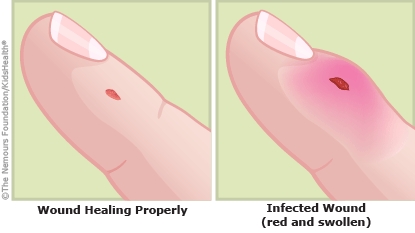Most injuries from cat bites are minor, but many bites get infected by bacteria from the cat's mouth. So it's important to watch for redness, warmth, swelling, and other signs of infection. Some cat bites need to be closed with stitches, but most are left open to heal. Your child's health care provider likely prescribed an antibiotic to prevent or treat infection. They also might have given a tetanus shot if your child hadn't gotten one recently.


Note: Don't give aspirin to your child or teen, as it can be dangerous.



What can help prevent cat bites? Teaching kids to be cautious and gentle with pets and to avoid unknown stray animals is the best way to prevent bites from cats and other animals.
Why are cat bites so likely to get infected? Because cats have teeth that are long and slender, cat bites often cause a deep puncture wound that can get bacteria into the skin or deep in the tissues around a bone or a joint. When this happens, infection is likely. About half of all cat bites become infected, especially those on hands. So most cat bites are treated with antibiotics, which can prevent some infections. If a cat bite does get infected, it usually happens quickly, causing skin redness, swelling, and pain 12–24 hours after the bite.
Can my child get cat scratch disease after a cat bite? Rarely, a cat bite can cause a mild bacterial infection called cat scratch disease. This is different from a wound infection. Watch your child for swollen lymph nodes (glands), fever, or a general unwell feeling a week or two after the bite. Cat scratch disease can happen even if the cat appears healthy, and especially if it's a kitten.